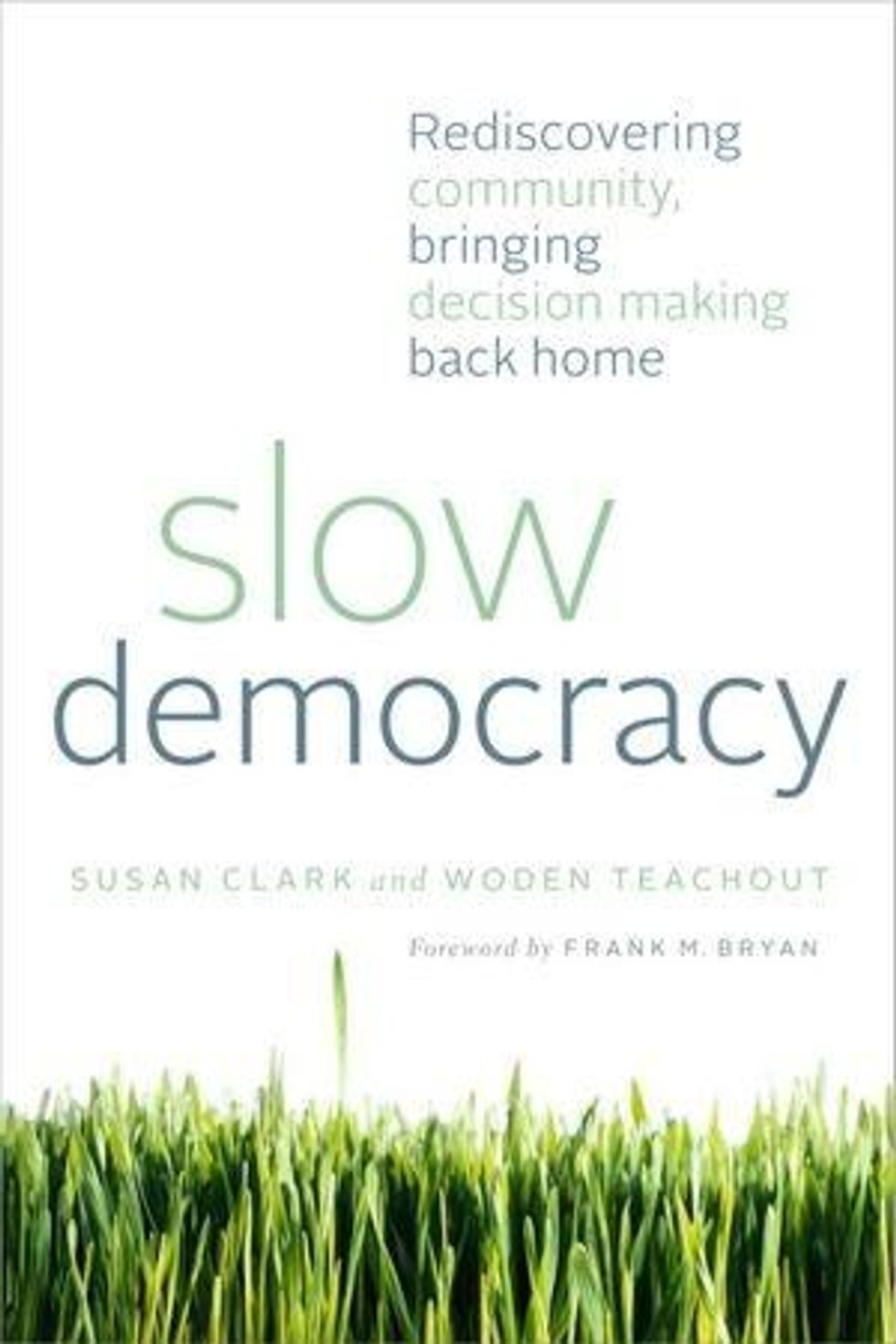Here we are, one week before the election, in the midst of electoral fatigue. Most citizens feel a deep cynicism about the candidates and the federal government.
Our federal electoral and governing systems have proven themselves inept at creating solutions that work to solve complex problems, leading many people to become disengaged, disgusted and even disenfranchised. What hope is there for democracy in all this?
One answer is to take a page from the slow food and locavore movements, and start local. Not everyone can make change at the national level, but most of us can in our neighborhoods. What if we decided to turn our attention to our local places rather than shout at, or into, the din of national politics? Not instead of the presidential election, but as a necessary complement: an untapped sphere of possibility for democratic practice?
We propose Slow Democracy. We recognize that the term is its own punch line: isn't government agonizingly slow already? Joking aside, our democracy has much to learn from the paradigm shift of the various "slow" movements. Instead of seeing politics as the exclusive province of Washington, we should focus on the democratic possibilities in the neighborhoods and towns right where we live. Local communities have the ability to address fundamental issues and create real change. Many of them have already done so.
How do they do it? We've looked at communities around the country where this approach to decision-making is thriving, and we've identified four key elements of a truly 'slow' democracy:
- It must be local. Citizens must feel a direct connection to the problem and how to fix it.
- It must be inclusive: It can't be the same old backroom deal. It has to be a process that ensures broad, representative public participation.
- It must be deliberative: Define problems and weigh solutions from a wide range of views in a thoughtful, respectful, and open dialogue.
- It must provide power: People must see a clear connection between participation, public decisions, and action.
These aren't abstract concepts to anyone, nor are they relegated to the halls of academia. Communities around the country -- from the neighborhoods of Chicago to the town halls of New England -- are at the cutting edge of these very basic principles of self-governance. These communities aren't thinking about paradigm shifts: they are trying to solve real problems by using their community assets. But what they are doing is slow democracy. For example:
- The "meeting in a box" technique developed in Austin, Texas;
- Participatory budgeting adopted in districts of New York City and under consideration in a growing number of communities;
- Study circles, a community dialogue and deliberation approach used in Portsmouth, New Hampshire, Montgomery County, Maryland and many other places; and,
- The Heart and Soul community planning process used in Damariscotta, Maine and other small cities and towns
Slow Democracy means that there can be a range of regional democratic practices. What works in New England may not work in Oregon, and what works in Chicago may fall short in Austin. Slow democracy celebrates the terroir of community process.
When Alexis de Tocqueville came to the United States in 1831 to write Democracy in America, he commented on those regional differences. But he was even more struck by the commonality of American culture: the "political activity that pervades the United States [which] must be seen in order to be understood. " If he were to land at JFK today, he would be astonished by how, for many Americans, political engagement has diminished to the act of walking into a booth and pushing a button.
It is telling that Tocqueville identified the source of the United States' democratic strength as local government. "Municipal institutions constitute the strength of free nations," he wrote. "A nation may establish a system of free government, but without the spirit of municipal institutions it cannot have the spirit of liberty." With Slow Democracy, we propose strengthening those local democratic practices.
It's not that all decisions should be made locally, all the time. Some decisions should be made at the national level, especially when it comes to upholding basic rights: we think of civil rights, many environmental laws, and public health as key examples. Relying on far-off elected officials to make decisions for us is an integral part of the American system. But it is also true that many decisions that rightfully belong at the local level have been exported. Privatization, centralization, and the hyper-marketing of the individual have all served to further undermine our communities, resulting in more concentrated, centralized power -- and a public that has become, understandably, disengaged.
In the ongoing American balancing act between our national government and the citizens themselves, the pendulum has swung too far from the local.
Slow Democracy's goal is two-fold: to expand the power of those places where democracy is most vital, and to swing the pendulum back by providing citizens with the tools to govern themselves in the most inclusive, democratic, empowered, and effective ways possible.

